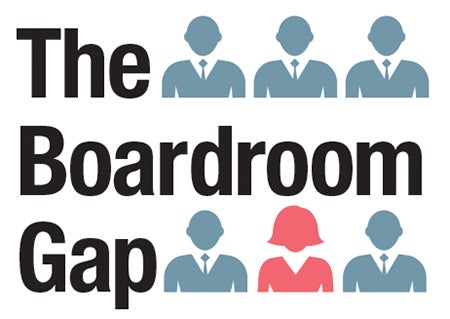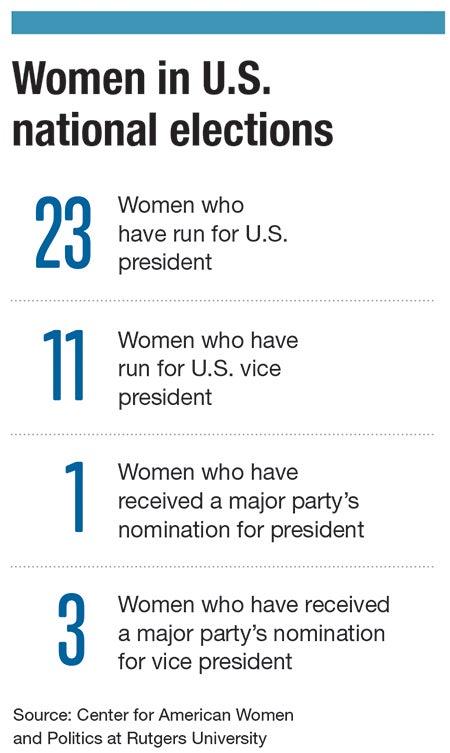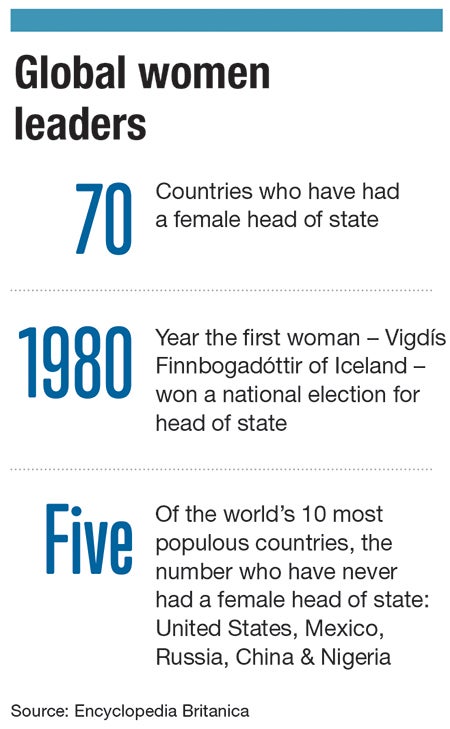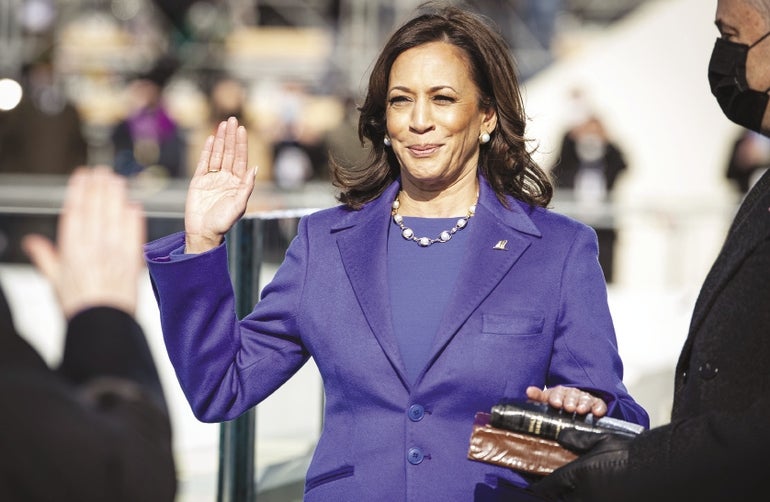The day before Vice President Kamala Harris assumed office on Jan. 20, the internet was aflutter with posts reiterating variations of the same momentous sentence: “This is the last day that we can say there has never been a woman vice president.”
Get Instant Access to This Article
Subscribe to Worcester Business Journal and get immediate access to all of our subscriber-only content and much more.
- Critical Central Massachusetts business news updated daily.
- Immediate access to all subscriber-only content on our website.
- Bi-weekly print or digital editions of our award-winning publication.
- Special bonus issues like the WBJ Book of Lists.
- Exclusive ticket prize draws for our in-person events.
Click here to purchase a paywall bypass link for this article.
The day before Vice President Kamala Harris assumed office on Jan. 20, the internet was aflutter with posts reiterating variations of the same momentous sentence: “This is the last day that we can say there has never been a woman vice president.”
Indeed, the moment Harris was sworn into office, she became the first woman, as well as Black and South Asian person, to assume the role, shattering a glass ceiling seconded only by the presidency itself, making her not only a groundbreaker, but for women and girls alike, an example of what is possible.

“The quote that has always been in my mind is ‘I can’t be what I don’t see,’” said Rachel Ferreira, director of the Institute for Women’s Leadership at Nichols College in Dudley.
The adage holds not just for politics, but for business, where Ferreria said her team works to make students aware of both implicit and explicit gender bias – examples of which can be unsettlingly easy to come by. Even an activity as simple as watching a movie where boardrooms are shown can spark conversations about how leadership is depicted in modern culture, she said.
“I don’t think a lot of people realize they associate business with men and why,” Ferreira said.
So accustomed are audiences to seeing men hold leadership positions in the business world and beyond, it can take intentional self-interrogation to even realize bias is happening. Even having a person like Harris, who represents multiple historically marginalized groups, on television, participating in and making waves at presidential debates, Ferreira said, ensures viewers, voters and would-be leaders are being presented with a different set of norms.
“She was very commanding, which is not a trait that we necessarily teach women,” Ferreira said of Harris’ performance in the vice presidential debate in October, adding women typically need to come off as though they’re being collaborative.

Representation matters
While Harris’s position is an elected public office compared to, for example, a c-suite position at a private corporation, the image of a woman in such a visible, high-level job sends the message men are not the only people capable of wielding power, whether in the Senate or in the boardroom.
“Absolutely representation matters, and so having Kamala Harris as a woman, a Black woman, an Indian American woman, was so resonant for so many people in terms of what that meant, or the possibilities for themselves, their children, or people they care about,” said Charlotte Haller, professor and department chair of history and political science at Worcester State University.
But while many are rightfully eager to tout the immediate impact of Harris assuming office – and only four years after Hillary Clinton lost her bid to be elected president, despite winning the popular vote – the reality, said Haller, is it’s going to be years before the long-term ramifications of the country’s new vice president are borne out.
“These are the kinds of things that you see the impact of, maybe not immediately, but say, maybe in 10 years or 20 years,” Haller said. “The impact is often on children who are seeing what’s possible in a really fundamental way.”
It’s less likely, Haller said, adult women will see Harris as the country’s second-in-command and then decide to run for a local board position. (That said, Haller noted, Clinton’s loss in 2016 did seem to contribute to a wave of women making bids for public office, such as in the 2018 midterm congressional elections.)
Perspective matters, too
Harris holds a position intrinsically historical and inspirational, although she will still have to make the office her own. As if it's not enough pressure being the first woman of color to hold the title, vice presidencies are notoriously fickle positions. Some vice presidents are more active in policy making than others. It’s still too early to say what kinds of responsibilities Harris will take on, as well as what kinds of responsibilities President Joe Biden will assign her.
Moreover, it would be reductive to assert simply getting Harris to office represents the end of the trailblazing possible under the Biden-Harris Administration. The reality is getting women into leadership positions is only part of the battle. Affecting change requires more than just elevating a single person; it requires changing hearts and minds of those around them.
“Just getting in the door solves one thing,” Haller said. “But there’s always huge cultural changes that need to happen to hear women’s voices, have them be respected.”
That is no small task.

“We’re really looking at the double standards and the bias that women face, [which] unfortunately, are not going to go away just because we have a woman vice president,” said Amanda Hunter, executive director of the Barbara Lee Family Foundation in Cambridge, which researches about women running for elected office. “And the more that we can talk about those obstacles, both so that women in politics understand, but also the votes so voters can understand their own bias is so important.”
Women are still expected to behave differently, even if they do break glass ceilings. All experts interviewed for this story pointed to the groundwork still needing to be done to ensure women are both treated and respected equally, both in business and on the campaign trail.
Not to be understated, though, Harris has brought with her to Washington, D.C. an entire lifetime’s worth of experiences which are dramatically different than any of those brought to the office by anyone else who has held it. This will necessarily inform how she approaches her job, and serves as a reminder of why it’s important to give people from all walks of life seats at both the literal and proverbial table.
“Representation really matters and the fact that Vice President Harris made history and now so many women and girls and children can see themselves in her is so powerful. But we also know that lived experience matters,” Hunter said.
To have Harris in the vice presidency, Hunter said, means someone with different perspectives than ever before will be influencing decision-making in a way that’s never been done before, all by virtue of having lived a different life.
That change in point of view will ensure the needs and priorities of those not traditionally represented in high-level leadership will be innately present, one of the many reasons diversity matters. The same can be said of the private sector, as well.

